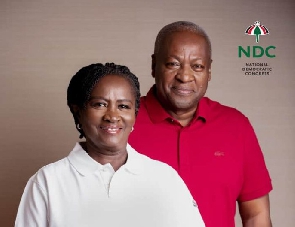Opinions of Friday, 21 March 2014
Columnist: Otchere-Darko, Gabby Asare
Ouattara is showing competent leadership next door
By Gabby Asare Otchere-Darko
My new job as a consultant on Africa’s governance and economic environment allows me to analyse deeper than I ever used to in the past, as head of a Ghana-focused public policy think tank, the performance of various governments and developments in various countries across the African continent. And, I must say that I have been most impressed with the work being done currently by the 72-year-old leader of Côte d’Ivoire, Alassane Ouattara, especially on the economy of the West African country.
In 2011, the year that Ouattara finally had the chance to lead the country he won the right to lead in the violently disputed 2010 election, the economy suffered a negative growth rate of -4.7%. By 2012, GDP growth had shot up remarkably to 9.8%, and in 2013, growth was estimated, again, at around 9%. The country now aims for double-digit economic growth in 2014-2015. Driving these impressive growth rates is a surge in both foreign investment inflows and public spending, which is hitting 7% of GDP this year, according to the IMF.
With Ouattara, what you see is a nation with a plan and a leader committed to follow that plan and a people desperate to see that change manifested. The international image of Côte d’Ivoire and its competent leader can be summed up in the words of Wayne Camard, the IMF’s resident representative in the country: “The president has a clear idea where he wants to go…” he says.
I will indulge Ghanaians and Sierra Leoneans, especially, to look closer at the kind of competent leadership that the man next door is offering to a country that, three years ago, was caught up in an arms conflict. Tellingly, most of the companies, which moved to Ghana from Côte d’Ivoire, are moving right back.
After a decade of conflict and turmoil, Côte d’Ivoire is back and reclaiming its old position as the regional hub for West Africa, a geographical area which is likely to boast of a population of half a billion people by 2030 and a fast-growing middle-class.
The Ouattara government’s objective, which was clearly laid out in the highly impressive “Invest in Côte d’Ivoire Forum (ICI) 2014” held earlier this year in Abidjan, is to mount a large-scale mobilisation of private-sector support for economic transformation. Ouattara is keen on diversifying the economy to reduce the country’s reliance on cocoa and coffee and he is, rightly so, putting a lot more focus on the agribusiness value chain.
First things first. The President knows he needs energy to power his economic recovery and transformation and has embarked on an aggressive energy programme that seeks to double the country’s electricity capacity by 2020. This is linked to his goal of getting Côte d’Ivoire to join the ranks of emerging market economies by the same year, 2020. Already, in the last 2 years alone, he has been able to attract, through a very overt investment drive, a US$7 billion worth of investment to the country’s energy sector, unashamedly supporting indigenous power companies to win huge power plant contracts. The Ivorian President puts his aspirations for his country this way: “We are striving to be the sub-region’s hub, the entry point to West Africa, a market of over 300 million individuals. Reaching this goal entails forging strong, sustainable partnerships with economic operators who can seize the opportunities created by growth.”
A major priority of the Ouattara administration is to empower the private sector and improve the ability for entrepreneurs and investors to do business in Cote d’Ivoire. The good news is that, it is working, at least, going by the multi-billion dollar deals that were struck during the three-day ‘Invest in Côte d’Ivoire Forum (ICI) 2014’, which took place at the end of January. The 2014 Forum focused on the leading role the private sector must play in making the country a regional business hub, something Ghana has been saying for some years now but doing little to achieve a convergence between talk and walk.
On the other hand, according to a recent international report, Doing Business 2014, Côte d’Ivoire is among the countries that implemented the highest number of reforms in improving the business climate in the 2012-2013 period. We must ask ourselves, after a decade of conflict and turmoil, what has inspired Côte d’Ivoire to come back boldly to reclaim the economic leadership position in West Africa? What stopped its neighbours from surging ahead when that country was on its knees?
Like Ghana, Côte d’Ivoire is blessed with a wealth of natural resources, a strategically advantageous location, a pleasant climate and a level of infrastructure, though far from global standard, is unrivaled in the West African region. Ghana was becoming more stable and democratic as its neighbor struggled.
There is something intangible but real about leadership that citizens cannot afford to ignore. For example, Ouattara’s unfolding success speaks volumes to us. It tells us that leadership is key to the success of a country, even if that success has to be driven by the private sector. It tells us that track record matters a lot when choosing a leader, especially for a country still young in the process of strengthening its institutions of state.
Born in 1942, Ouattara is certainly not a young man. But, what he brings to the leadership of his nation is experience and maturity. In spite of his age, he has the confidence and conviction to seek a second term next year and he is likely to win because the people of Côte d’Ivoire are likely to look at his performance rather than his birth certificate. He has managed to keep together the party he has led since 1999, the Rally of the Republicans (RDR), and built in the process some useful political alliances.
An economist by profession, he has had many ups and downs in the politics of his country, becoming a victim of a very negative ethnocentric nationality issue, which barred him from running for office, becoming a major factor in the coup of 1999, to set the country on that long bumpy ride of instability.
As he prepares for re-election in October 2015, his biggest challenge now is how to reconcile the country, undertake the necessary electoral reforms, enforce security, take the guns off the streets, and guarantee the stability that is needed to keep the economy going.
So far, what President Alassane Ouattara has shown is that a lot can be achieved with a leadership that is visionary, focused, decisive, and committed. We should celebrate such leaders and challenge those who are falling short to do more to emulate and surpass.
The author is CEO of Global Dynamix Consult, an Africa-focused consultancy firm based in the UK.












